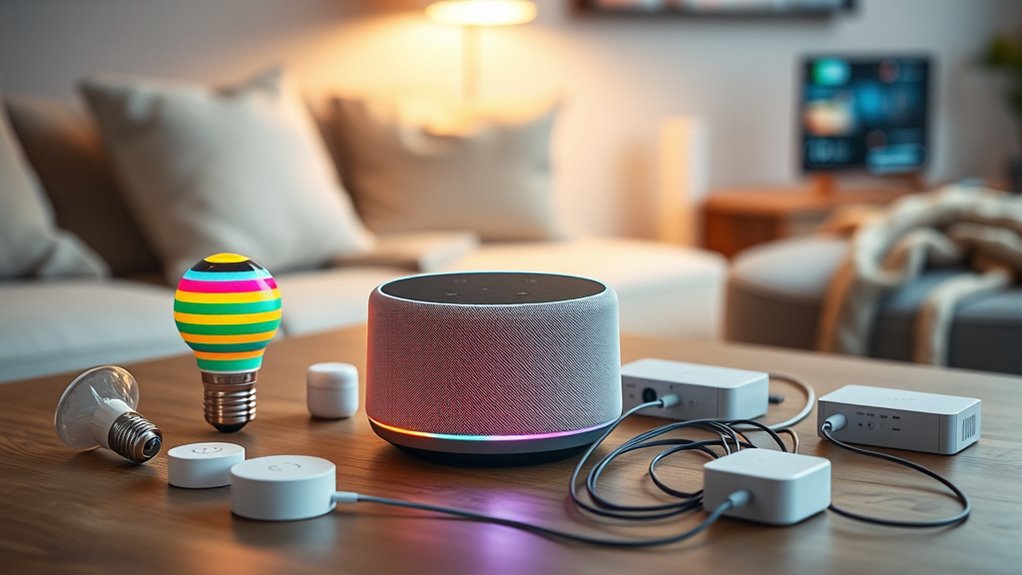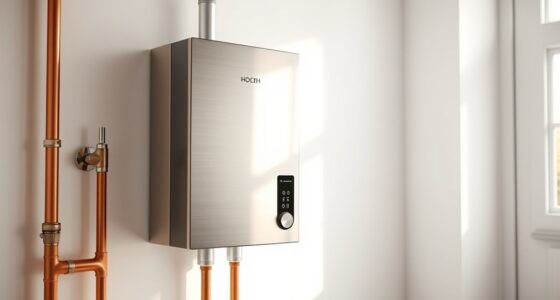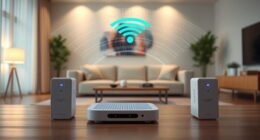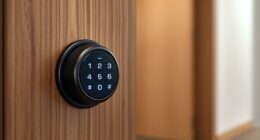A Zigbee hub is essential for your smart speaker to reliably connect and control Zigbee-enabled devices in your home. It acts as a central translator, linking your smart speaker with Zigbee gadgets, making setup and management simpler. The hub creates a mesh network, improving coverage, reliability, and security for all your devices. Without it, connecting Zigbee devices can be tricky and less dependable—keep going to discover how to boost your smart home experience.
Key Takeaways
- A Zigbee hub enables your smart speaker to control Zigbee-compatible devices seamlessly through a central point.
- It creates a reliable mesh network, improving device connectivity and reducing dead zones in your smart home.
- The hub translates Zigbee signals, allowing your smart speaker to communicate with a wider range of smart devices.
- Using a Zigbee hub enhances security with encrypted communication and reduces command delays or failures.
- It simplifies device management by consolidating controls into one system, eliminating the need for multiple apps.
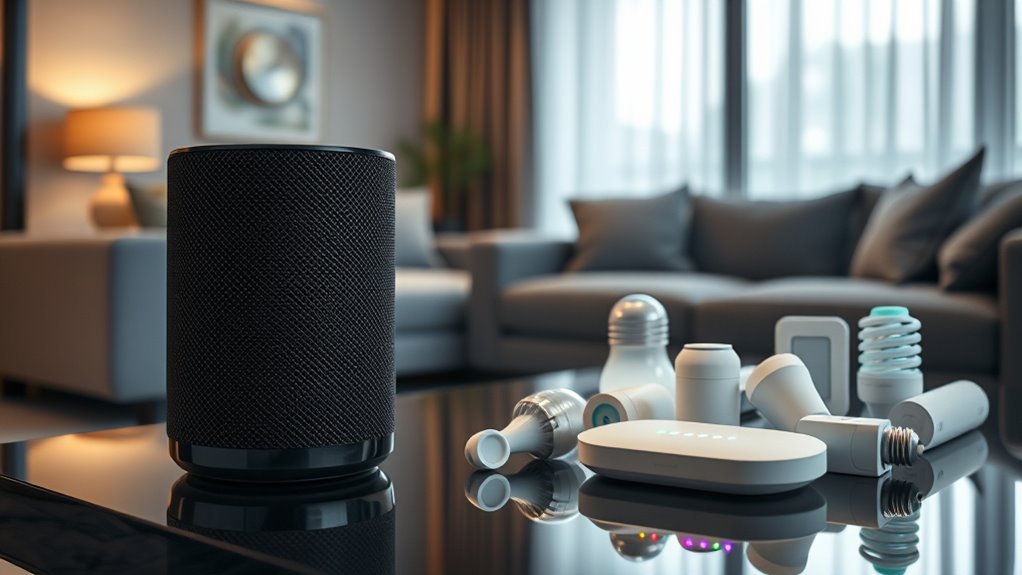
Smart speakers have become central to modern smart home setups, offering voice control and seamless access to various devices. You rely on your smart speaker to turn on lights, adjust the thermostat, play music, and even lock doors—all with just your voice. But to make all these functions work smoothly, your smart speaker needs to communicate effectively with a wide range of smart devices. That’s where a Zigbee hub comes into play. Without it, your smart speaker’s ability to control compatible devices can be limited, especially when you’re dealing with different brands and protocols.
Voice control is the main benefit of having a smart speaker, but it’s only as good as the devices it can connect to. Many smart devices operate on different standards, such as Wi-Fi, Bluetooth, or Zigbee. Zigbee, in particular, is popular because it’s designed for low-power, reliable, and secure communication among smart home gadgets. If your smart speaker doesn’t have built-in Zigbee support, integrating Zigbee-based devices can be a challenge. You might need to connect each device directly to your Wi-Fi network or rely on multiple apps, which complicates control and reduces the convenience you’re after.
Without Zigbee support, connecting and managing smart devices can become complicated and less convenient.
Adding a Zigbee hub acts as a translator and central controller. It connects your smart speaker to Zigbee-compatible devices, creating a unified ecosystem. This setup ensures that when you give a voice command, your smart speaker can easily identify and communicate with the right device, no matter the brand. The hub simplifies device compatibility issues, making it easier to expand your smart home without worrying about whether your new gadgets will work with your existing setup. Instead of managing multiple apps or dealing with incompatible protocols, the hub acts as a bridge, facilitating smooth, direct control through your voice.
Furthermore, a Zigbee hub enhances your smart home’s reliability. Zigbee operates on a mesh network, meaning each device can pass signals to others, improving coverage and reducing dead zones. When your devices are connected through a hub, commands are transmitted more reliably, minimizing lag or failures. This setup also boosts security, as Zigbee offers encrypted communication, which keeps your data safe from external threats.
In addition, understanding the importance of contrast ratio can help you choose a projector that provides deeper blacks and more vibrant images, which is essential for an immersive viewing experience.
In essence, integrating a Zigbee hub with your smart speaker elevates your home automation experience. It broadens your device compatibility, streamlines control, and enhances the overall reliability of your smart home system. With a hub in place, your voice control becomes more powerful and versatile, allowing you to seamlessly manage an expanding array of smart devices with confidence.
Frequently Asked Questions
Can I Connect Multiple Smart Speakers to One Zigbee Hub?
Yes, you can connect multiple smart speakers to one Zigbee hub for a seamless multi-device setup. This allows you to synchronize your speakers effortlessly, creating a unified audio experience. By centralizing control through the hub, you simplify speaker management and enhance speaker synchronization across your smart home. Just guarantee your smart speakers are compatible with Zigbee, and you’ll enjoy synchronized sound and easy control with a single hub.
Does a Zigbee Hub Improve Smart Speaker Security?
Imagine your smart speaker communicates sensitive info, like your Wi-Fi password. A Zigbee hub boosts security enhancement by centralizing device control and adding an extra encryption layer. It manages device encryption more effectively, reducing vulnerabilities. For example, a smart home with a Zigbee hub prevented unauthorized access during a breach. So, yes, a Zigbee hub considerably improves your smart speaker’s security by safeguarding your data and devices.
Are Zigbee Hubs Compatible With All Smart Speaker Brands?
Zigbee hubs aren’t compatible with all smart speaker brands, so you should check their wireless protocols and device compatibility first. Some smart speakers work seamlessly with Zigbee, while others don’t support it at all. To guarantee smooth integration, verify your speaker’s specifications and see if it can connect to a Zigbee hub. This way, you avoid compatibility issues and get the most out of your smart home setup.
How Does a Zigbee Hub Affect Smart Speaker Response Time?
Ever wonder if a Zigbee hub improves your smart speaker’s response time? It can, by reducing wireless interference and offering signal amplification. Instead of relying solely on Wi-Fi, the hub creates a dedicated mesh network, ensuring commands are faster and more reliable. This setup minimizes delays caused by network congestion, so your voice commands feel more immediate and seamless, making your smart home experience smoother and more responsive.
Can a Zigbee Hub Control Non-Smart Devices?
Yes, a Zigbee hub can control non-smart devices, especially legacy devices that lack Wi-Fi or app control. It acts as a bridge, enabling automation and remote control for these traditional gadgets. Without a Zigbee hub, your smart speaker’s automation limits are evident, as it can’t directly manage legacy devices. By connecting everything to a Zigbee hub, you expand your smart home’s capabilities and streamline control.
Conclusion
Incorporating a Zigbee hub with your smart speaker simplifies your smart setup, streamlines your smart home, and secures seamless, synchronized control. By bridging barriers between devices, you become better equipped to boost your brilliance and build a beautifully balanced, Bluetooth-enabled, buzzy home. Don’t delay—dive into the world of wireless wonder, widen your Wi-Fi wisdom, and watch your smart speaker’s potential truly shine. Elevate your experience, empower your environment, and enjoy effortless automation today.
